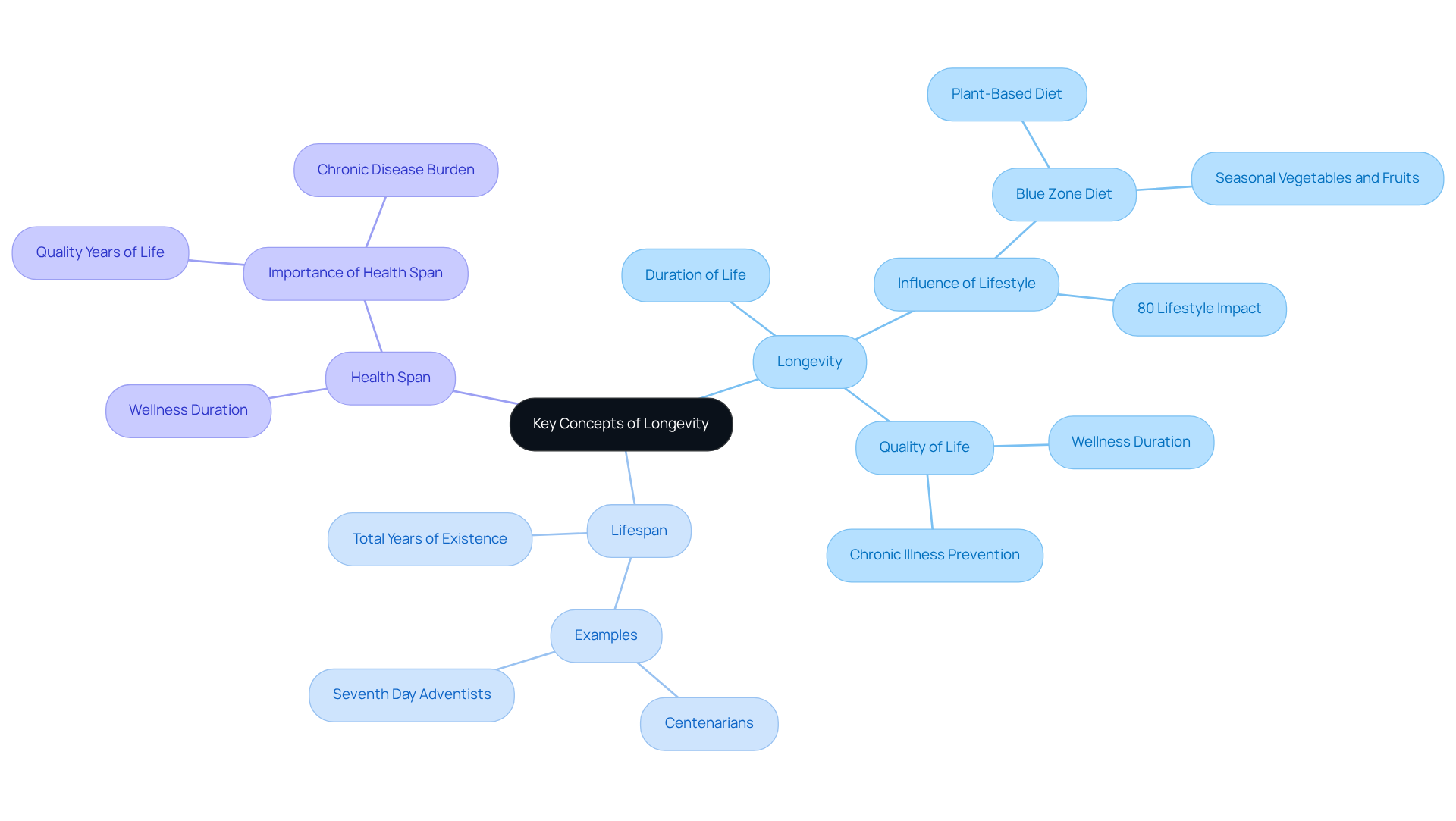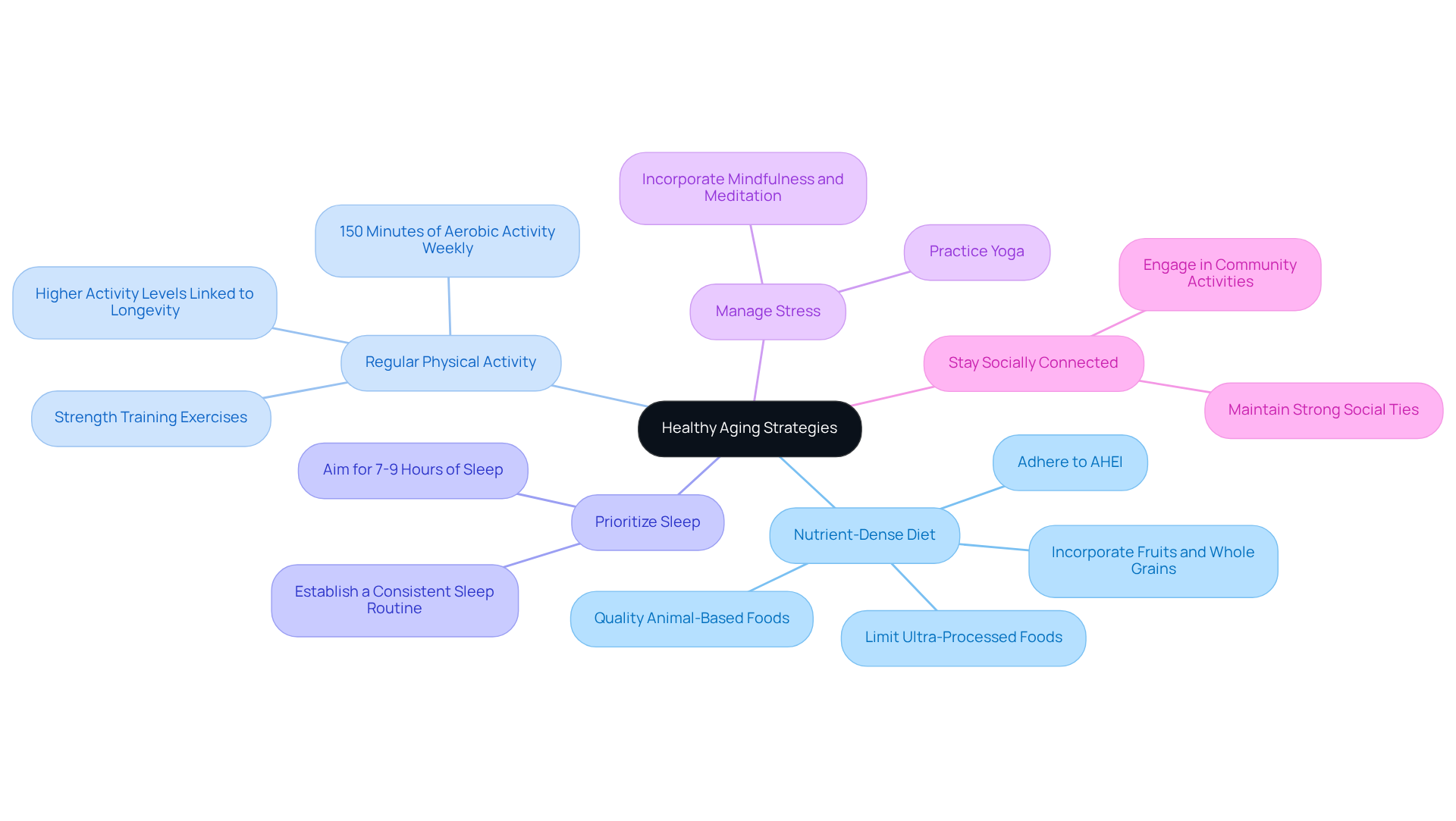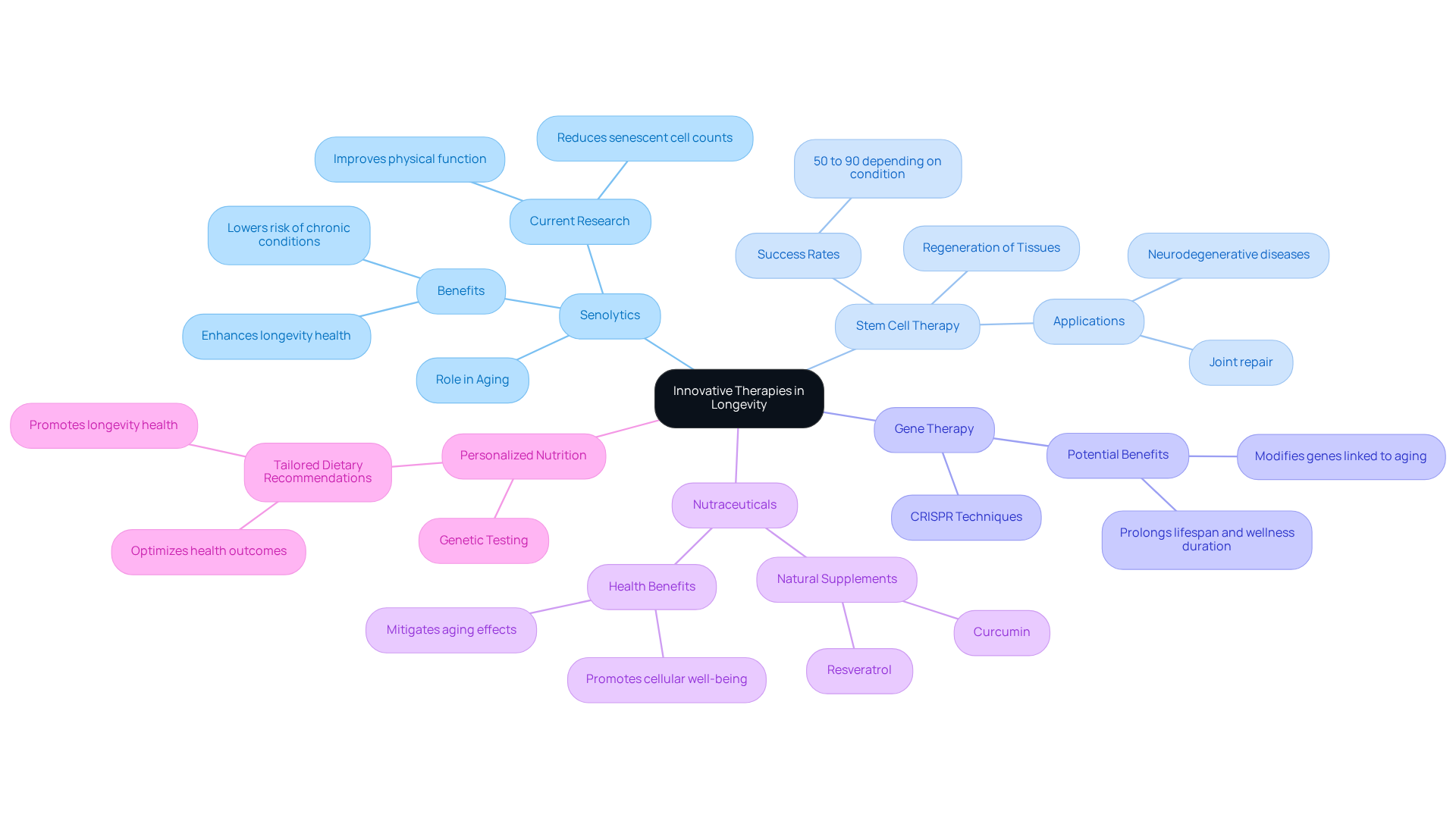Unlock Longevity Health: Strategies and Innovations for Aging Well
Overview
This article delves into strategies and innovations aimed at promoting longevity health. It underscores the crucial role of lifestyle choices, diet, physical activity, and emerging therapies in enhancing our health span. Did you know that approximately 80% of longevity is influenced by lifestyle factors? Nutrient-dense diets and regular exercise are key components, alongside innovative therapies such as senolytics and gene therapy, which seek to improve overall well-being.
Furthermore, understanding these elements can empower individuals to make informed decisions about their health. By adopting healthier habits and exploring new therapeutic options, we can significantly impact our longevity. As a result, embracing these strategies not only fosters a longer life but also enhances the quality of our years.
In conclusion, prioritizing lifestyle choices and staying informed about emerging therapies can lead to a healthier, more fulfilling life. Explore further resources to learn more about how you can take action today.
Introduction
The quest for longevity has captivated human interest for centuries. People seek not only to extend their years but also to enhance the quality of life during those years. This article delves into the essential concepts of longevity, lifespan, and health span, highlighting the profound impact that lifestyle choices have on overall well-being. With emerging strategies and innovative therapies at the forefront of longevity science, the question remains: how can individuals effectively navigate the complexities of aging to unlock a healthier, more vibrant life?
Define Key Concepts: Longevity, Lifespan, and Health Span
Longevity refers to the duration of an individual’s life, typically measured in years. Lifespan denotes the total years a person exists, while wellness duration signifies the time during which an individual remains well and free from chronic illnesses. This differentiation is crucial for creating approaches that not only seek to prolong lifespan but also enhance longevity health, allowing individuals to relish their later years with vitality and well-being. For instance, an individual may reach the age of 90, but their wellness duration might only extend to 70 years, emphasizing the importance of prioritizing quality of life alongside longevity.
Recent research indicates that lifestyle decisions significantly affect longevity health duration, with approximately 80% of longevity shaped by these factors rather than genetics. This underscores the importance of adopting beneficial habits, such as those observed in Blue Zone communities, which emphasize a diet rich in seasonal vegetables, fruits, and legumes to optimize both longevity health and lifespan. Furthermore, innovative treatments like oxytocin supplementation and the synergistic effects of TMG with NMN are emerging as promising strategies to enhance cellular function and support well-being.
Notably, Americans, on average, die 8-10 years earlier than Seventh Day Adventists, further illustrating the impact of lifestyle on longevity health. As one study states, ‘Studies have shown that what we eat may be one of the most important lifestyle modifications any one of us can make to significantly increase our healthspan.’ Incorporating personal experiences or frequently asked questions could further enrich this discussion, making it more relatable and engaging for health-conscious individuals.

Implement Effective Strategies for Healthy Aging
To promote healthy aging, consider the following strategies:
- Adopt a Nutrient-Dense Diet: Emphasize a diet rich in quality animal-based foods, essential for supporting bodily functions and overall well-being. Incorporate nutrient-dense options such as organ meats, fatty fish, and high-quality dairy products. For instance, ribeye steaks can be a delicious and nutritious addition to your diet when prepared correctly. Remove the steaks from the refrigerator about 30 minutes before cooking to allow them to come to room temperature. Pat them dry, season generously with salt and pepper, and sear them in a hot cast-iron skillet with olive oil for a golden brown crust. Basting with grass-fed butter enhances flavor and nutrition. Research suggests that increased consumption of fruits, whole grains, and beneficial fats correlates with better chances of well-being in later life. Individuals in the top dietary pattern quintile demonstrate considerably enhanced wellness results. Notably, adherence to the Alternative Healthy Eating Index (AHEI) was associated with 84% greater odds for healthy aging, reinforcing the importance of a nutrient-dense diet.
- Engage in Regular Physical Activity: Aim for at least 150 minutes of moderate aerobic activity each week, complemented by strength training exercises. This combination is essential for preserving muscle mass, bone density, and cardiovascular well-being. Research shows that older adults engaging in higher levels of physical activity are twice as likely to be disease-free and fully functional after 10 years, highlighting the profound impact of exercise on longevity.
- Prioritize Sleep: Quality sleep is essential for recovery and overall well-being. Aim for 7-9 hours of uninterrupted sleep each night to support cognitive function and emotional well-being. Insufficient sleep can lead to cognitive decline and increased risk of chronic diseases, making it essential to establish a consistent sleep routine.
- Manage Stress: Incorporate stress-reducing practices such as mindfulness, meditation, or yoga into your daily routine. Persistent stress adversely affects wellness and hastens the aging process, thus discovering effective methods to handle stress is essential for preserving overall well-being.
- Stay Socially Connected: Maintain strong social ties and engage in community activities. Social interaction has been associated with enhanced mental well-being and longevity. Studies show that individuals with strong social networks tend to experience better well-being outcomes as they age. Engaging in social activities can enhance emotional support and reduce feelings of isolation, contributing to a healthier, longer life.

Explore Innovative Therapies and Scientific Advances in Longevity
Recent advancements in longevity science have introduced several innovative therapies that deserve attention:
- Senolytics: These medications are specifically formulated to remove senescent cells, which play a significant role in the aging process and age-related diseases. Current research indicates that the removal of these cells can enhance longevity health and lower the risk of chronic conditions. Studies show that senolytic treatments can lead to improvements in physical function and reductions in senescent cell counts.
- Stem Cell Therapy: This therapy emphasizes the regeneration of damaged tissues and organs, potentially reversing certain effects of time. Recent statistics reveal that success rates for stem cell therapy in treating age-related diseases can range from 50% to 90%, depending on the condition. Ongoing studies are exploring its efficacy in various contexts, including neurodegenerative diseases and joint repair.
- Gene Therapy: Techniques such as CRISPR are being explored for their potential to modify genes linked to the passage of time. This innovative method offers the potential to improve longevity health by focusing on genetic elements that lead to age-related deterioration, thereby prolonging both lifespan and wellness duration.
- Nutraceuticals: Supplements derived from natural food sources, including resveratrol and curcumin, are under study for their anti-aging properties. These compounds have shown promise in promoting cellular well-being and mitigating the effects of aging. Ongoing research is examining their mechanisms of action and effectiveness.
- Personalized Nutrition: Advances in genetic testing are enabling tailored dietary recommendations that align with individual genetic profiles. This personalized approach optimizes health outcomes and promotes longevity health by ensuring that nutritional strategies are specifically suited to each person’s unique biological makeup.
As we explore these therapies, it becomes clear that the future of longevity science holds great promise for enhancing our health and well-being.

Conclusion
Embracing strategies for longevity health is essential for enhancing not just the length of life, but the quality of those years. By understanding the distinctions between lifespan and health span, individuals can prioritize their well-being, ensuring they enjoy their later years with vitality. Lifestyle choices significantly influence longevity, with factors such as diet, exercise, sleep, and social connections playing pivotal roles in shaping health outcomes as one ages.
Key insights include:
- The importance of a nutrient-dense diet
- Regular physical activity
- Effective stress management
All of which contribute to a healthier aging process. Furthermore, innovative therapies like senolytics, stem cell therapy, and personalized nutrition illustrate advancements in longevity science, offering promising avenues for enhancing health span. Together, these strategies and innovations form a comprehensive approach to aging well, demonstrating that proactive measures can lead to substantial improvements in overall well-being.
As individuals navigate their journey toward healthy aging, it is vital to adopt these practices and remain informed about ongoing scientific advancements. The pursuit of longevity health is not merely a personal endeavor but a collective movement toward a future where aging is synonymous with vitality and fulfillment. By integrating these strategies into daily life, everyone can take significant steps toward unlocking their potential for a longer, healthier, and more vibrant existence.
Frequently Asked Questions
What is the definition of longevity?
Longevity refers to the duration of an individual’s life, typically measured in years.
How does lifespan differ from longevity?
Lifespan denotes the total years a person exists, while longevity focuses on the duration of life that emphasizes health and vitality.
What does wellness duration mean?
Wellness duration signifies the time during which an individual remains well and free from chronic illnesses.
Why is it important to differentiate between lifespan and wellness duration?
This differentiation is crucial for creating approaches that not only seek to prolong lifespan but also enhance longevity health, allowing individuals to enjoy their later years with vitality and well-being.
How do lifestyle choices affect longevity health?
Recent research indicates that approximately 80% of longevity is shaped by lifestyle decisions rather than genetics, highlighting the importance of adopting beneficial habits.
What are Blue Zone communities, and how do they relate to longevity?
Blue Zone communities are areas where people live significantly longer, often due to diets rich in seasonal vegetables, fruits, and legumes, which optimize both longevity health and lifespan.
What innovative treatments are being explored to enhance longevity health?
Emerging treatments like oxytocin supplementation and the synergistic effects of TMG with NMN are being explored as promising strategies to enhance cellular function and support well-being.
What is the difference in life expectancy between Americans and Seventh Day Adventists?
On average, Americans die 8-10 years earlier than Seventh Day Adventists, illustrating the impact of lifestyle on longevity health.
What role does diet play in increasing healthspan?
Studies have shown that dietary choices may be one of the most important lifestyle modifications to significantly increase healthspan.






